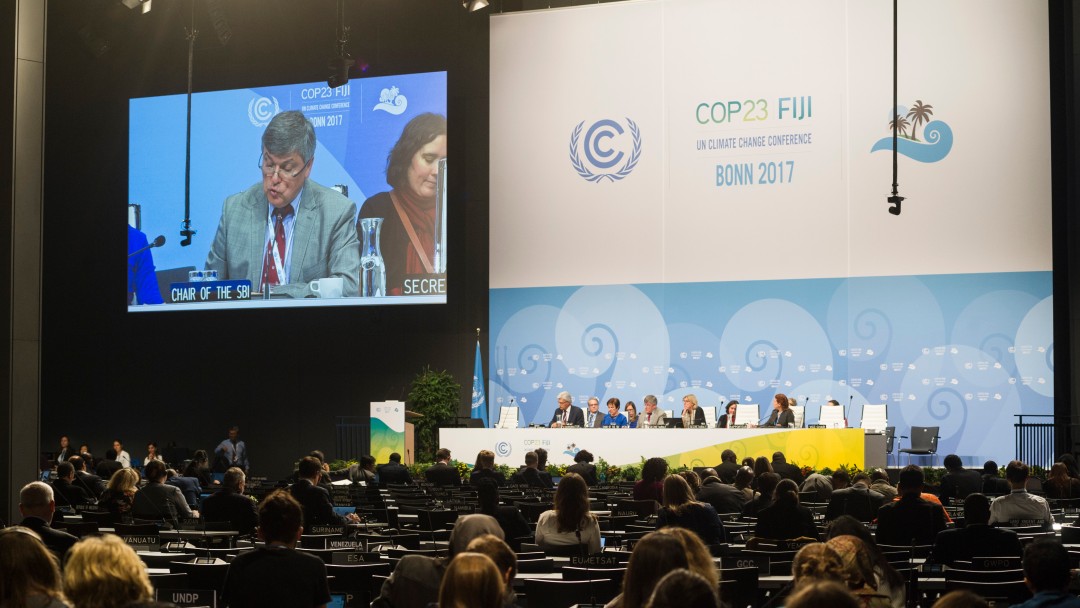News from 2017-11-23 / KfW Development Bank
Global climate change conference in Bonn concludes successfully
KfW plays its part with a raft of active contributions

The world climate change conference (COP23) drew to a close early on Saturday morning. Under the presidency of Fiji, the proceedings included important steps towards putting the Paris Agreement on climate change into practice. KfW was actively involved in more than two dozen events, taking a wide-ranging approach as it engaged in the discussion aiming for best possible achievement of the climate goals.
With around 22,000 participants from almost 200 countries, the global climate conference (COP23), held in Bonn between 6 and 17 November, was the largest event that the German city has ever hosted. The event took place in a constructive atmosphere where it became clear that the international community is committed to the goals of the Paris Agreement and not even a US withdrawal would hold back these developments.
The main aim at COP23, which had been billed in the run-up as a "working conference", was to make progress in working out the rules to implement the Paris Agreement. This was largely achieved. Comprehensive draft texts for rules and regulations were submitted, which are due to be refined in further detail in 2018 and officially approved at COP24 in Katowice (Poland). Methods to measure and describe successful accomplishments in climate protection, climate change adaptation and climate financing provision will be at the heart of this set of rules. The transparency and comparability of methods is of the utmost importance in this regard.
It was agreed that efforts for climate protection and adaptation to climate change must still be significantly increased. The necessary raise in ambition is to be achieved with processes including discussions known as the Talanoa dialogue. Talanoa is a Fijian word for exchange with all participants that is free of conflict. The dialogue aims to result in a review showing where the community stands on the path to attaining the climate goals and where more ambitious action is needed.
The topic of climate financing was a common focus throughout the discussions and negotiations. This included calls for an expansion of the financing efforts, as far as possible by mobilising private funds, as well as for greater transparency and comparability within the support provided. Adaptation to climate change played a major role at many of the meetings, particularly as the Fijian presidency served to highlight the threat to small island nations from climate change. A question that remains unanswered is how to financially support states that suffer irreversible damage and loss due to climate change and cannot either at all or sufficiently cushion the blow with adaptation measures.
COP23 offered KfW a good opportunity to constructively enter the debates about accomplishing the Paris climate goals and present its commitment to climate issues. KfW ran five side events, including two full-day sessions, and was involved in over 20 other events, mostly by giving presentations or taking part in panels. KfW’s contributions focused on the subjects of climate change adaptation and climate financing.
Two opportunities where KfW covered adaptation to the impacts of climate change were an all-day symposium on climate-resilient coastal infrastructure, which primarily discussed the importance of rising sea levels and tropical storms within investment decisions in coastal areas, and a side event on ecosystem-based climate change adaptation. In addition, KfW played a key role in preparing the official launch of the InsuResilience Global Partnership, an initiative to guard against climate and disaster risks. The new global partnership builds on the InsuResilience Initiative created under the German G7 presidency in 2015, which aims to insure another 400 million poor and especially vulnerable people against climate risks in developing countries by 2020.
Possible approaches to expand climate financing took centre stage at the day-long Climate Finance Forum organised by the International Development Finance Club, of which KfW is also a member. At a side event involving the German environment and development ministries, results-driven policy-based loans were presented as an innovative financing instrument to implement the Nationally Determined Contributions (the countries’ climate plans).
Other high points for KfW came with the signing of the first financing agreement with the Green Climate Fund for a climate-resilient infrastructure project in Bangladesh and of agreements for a new phase of the REDD for Early Movers climate protection and forest conservation programme. Additionally, the UN Climate Change Secretariat awarded the Momentum for Climate Action Award 2017 to the German Federal Ministry for the Environment, Nature Conservation, Building and Nuclear Safety/KfW project to restore peatlands in Russia.

Share page
To share the content of this page with your network, click on one of the icons below.
Note on data protection: When you share content, your personal data is transferred to the selected network.
Data protection
Alternatively, you can also copy the short link: https://www.kfw-entwicklungsbank.de/s/enzBWrMC.BsiA
Copy link Link copied